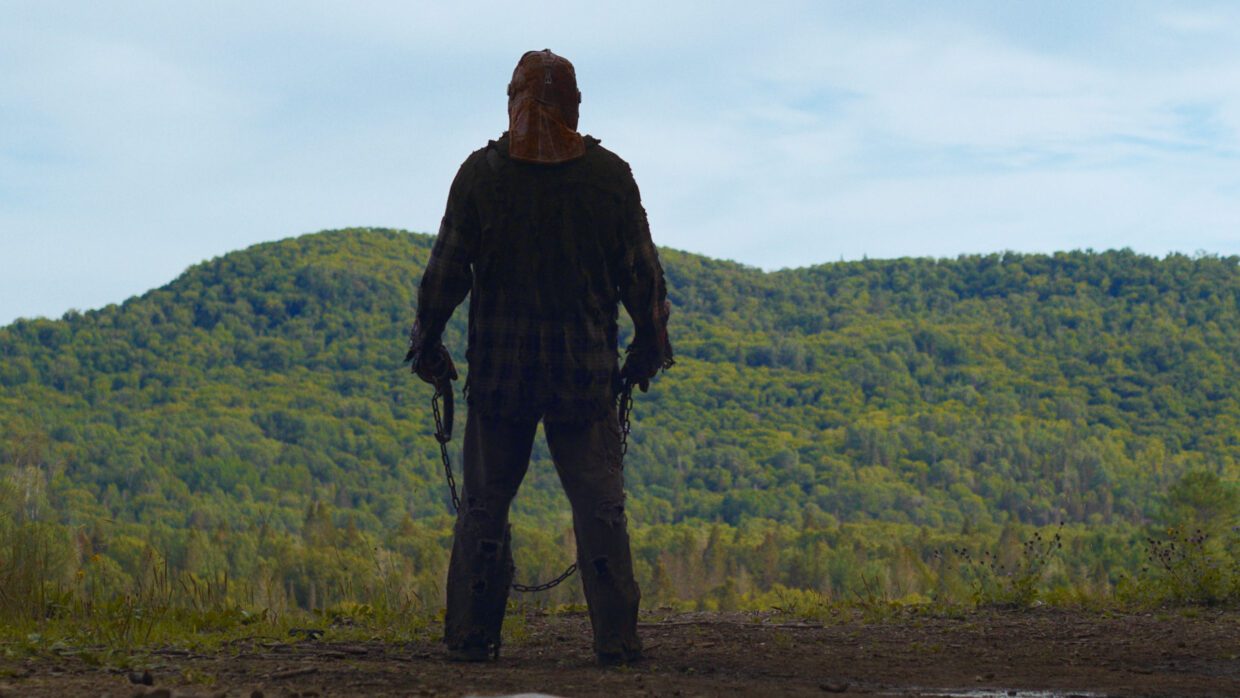 Back to selection
Back to selection
“Like If Pablo Larrain’s Jackie Was About Jason Voorhees”: Editor Alex Jacobs on In A Violent Nature
 A still from In A Violent Nature. Courtesy of Sundance Institute.
A still from In A Violent Nature. Courtesy of Sundance Institute. In a Violent Nature, the directorial debut of Chris Nash and a Sundance 2024 Midnight selection, puts a twist on the slasher film by staying close to the killer. Instead of the shenanigans in the secluded cabin with vaguely menacing sounds from outside, it shows us the killer trekking toward the distant voices.
The film also marks the graduation of editor Alex Jacobs, who worked on titles, graphics and credits on the V/H/S film to lead editor on another director’s project. Below, he shares his serendipitous introduction to the director and how his love of lo-fi beats helped him in editing.
See all responses to our annual Sundance editor interviews here.
Filmmaker: How and why did you wind up being the editor of your film? What were the factors and attributes that led to your being hired for this job?
Jacobs: I was texting my friend Peter about a recent slasher movie we had both watched, which I won’t name, that I had a very strong opinion about, and after a lot of my ranting about it he said “you know, I’m producing an unconventional slasher movie that you might be a good fit for,” and after a call with the director and another producer in which I described the script (which I loved) as “like if Pablo Larrain’s Jackie was about Jason Voorhees,” I got the gig!
Filmmaker: In terms of advancing your film from its earliest assembly to your final cut, what were your goals as an editor? What elements of the film did you want to enhance, or preserve, or tease out or totally reshape?
Jacobs: I was mostly obsessed with getting the movie into a rhythm that would stop people from wondering how long it had been on, given that a lot of it is seemingly just about a guy walking through the woods—my hope was the audience would lose themselves in the ambience, and I tried to get the edit flowing in a way that would keep anyone watching it.
Filmmaker: How did you achieve these goals? What types of editing techniques, or processes, or feedback screenings allowed this work to occur?
Jacobs: I watched the movie a lot! As soon as we had a cut, I was watching it constantly and tweaking it here and there until the buzzer, when we had to lock picture. It certainly helps if you love the movie you’re working on and don’t mind watching it over and over.
Filmmaker: As an editor, how did you come up in the business, and what influences have affected your work?
Jacobs: I started editing by making music videos out of recorded Counter-Strike matches I played with my friends online as a teenager, and never really stopped from there—I’m always editing some weird video for the internet just for my creative satisfaction. My professional editing career started in low/no-budget comedy, particularly “video podcasts,” which are basically feature-length talk shows, and those got me in the habit of listening to lo-fi beats while reviewing footage and trying to find a rhythm in what we had.
Filmmaker: What editing system did you use, and why?
Jacobs: I use Adobe Premiere because I have the most editing experience in it by far. I find it best for when you don’t have a lot of external editing support and aren’t sending the project around to too many people—we didn’t have a huge post department on this movie, so I was glad to be able to use it.
Filmmaker: What was the most difficult scene to cut and why? And how did you do it?
Jacobs: A sequence about being lost in the woods. I cut many different versions of it and watched them on a loop, often, while listening to all kinds of music (but mostly lo-fi beats) and chipping at it like marble, and I ended up throwing out the last version I exported after deeming it just a step too far.
Filmmaker: What role did VFX work, or compositing, or other post-production techniques play in terms of the final edit?
Jacobs: We mostly used VFX to smooth over splitscreen/retiming work, as well as to patch up some of the seams in the practical effects work, but most of the effects you’re seeing onscreen are practical. That’s real goop!
Filmmaker: Finally, now that the process is over, what new meanings has the film taken on for you? What did you discover in the footage that you might not have seen initially, and how does your final understanding of the film differ from the understanding that you began with?
Jacobs: I feel simultaneously a million years older than when I started and also kind of like the same person who just wanted to see this movie, though with a lot more problem-solving under my belt. It was an uphill battle to get the movie finished by all involved, so I’m happy it’s finally here.
